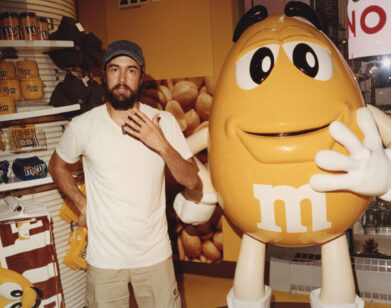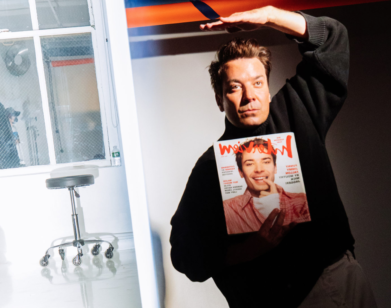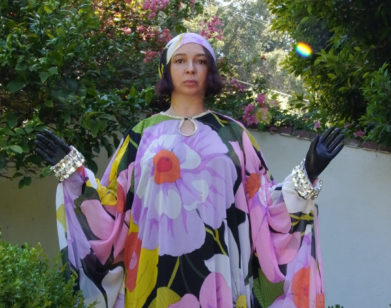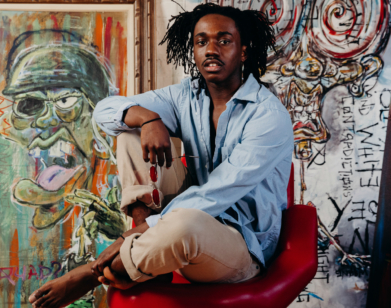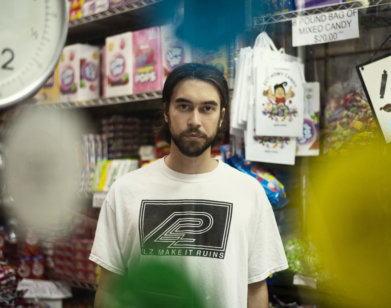Alex G on Fireworks, Faith, and Horror Movies
Listening to a new Alex G record for the first time is kind of like lighting a mystery firework from a gas station. You spark the fuse and watch it slowly burn, and while you know something exciting is about to happen, the exact shape of it is unclear until it explodes out of the package. His new album, God Save the Animals, is kind of like the big, surface-to-air types, spitting out different colors and formations at varying intensities. It’s a grab bag that brings to mind industrial, country, pop, and maybe some Gregorian chant. It’s fitting, then, that Alex Giannascoli loves fireworks. “I got one this year called Kiss of Death,” he told me recently. “It had like a skeleton making out with a human. It was so badass.”
But while his ninth album has the shapeshifting characteristic of previous Alex G releases, God Save the Animals feels like it was written by a person with a bit more perspective on life. Where on other albums there was a searching curiosity for what it means to grow older, here there is more resolution, a contentedness with how things have turned out. On “After All,” the album’s opener, a high-pitched narrator sings, “The years have passed and I can say / That a love will come in time.” Then, as if bookending this theme of satisfaction with the now, Giannascoli on the final track belts out with the assuredness of someone who has spent years contemplating it, “Forgive yesterday / I choose today.”
Giannascoli has always been relatively guarded about his life, reluctant to ascribe too much personal biography to the things he sings about. But it’s hard not to come away from the new album feeling that the man behind the songs is on the verge of realizing some higher plane, at a remove from the sometimes pained existence detailed in earlier albums like Beach Music and Rocket.
I spoke to Giannascoli ahead of the September 23rd release of God Save the Animals.
———
JONATHAN SMITH: A lot of your earlier work dealt with youth angst and the tensions that come from figuring life out as you age. It seems like there’s a bit less of that on this new album. It feels written from a more pulled back vantage point—maybe a person who doesn’t necessarily have it all figured out but is still sort of looking at life from above, in a way. Do you think there’s any truth to that?
ALEX GIANNASCOLI: Yeah, I guess so. Maybe it reflects where I’m at more than I realize. I’m not that calculated when it comes to the big picture of the records, but I think they end up probably being a reflection of my station in life more than I realize.
SMITH: Speaking of that pulled back vantage point, there’s obviously a lot of spiritual and biblical references on this album. Press materials mention a “generalized sense of faith” and that you’ve been drawn to “artists who balance the public and hermetic.” Do you think that interest in hermetic qualities, and faith more generally, was at all inspired by the past couple of years when everyone was a bit isolated and the world in general just felt like a kind of dark place?
GIANNASCOLI: I guess as far as hermetic stuff, I think it’s cool that it gives off that impression. I actually wasn’t aware that it was giving off that impression. The faith stuff I think was definitely inspired by my life—or I shouldn’t say my life—it was definitely inspired by my surroundings. But I think it was my surroundings before the pandemic and during the pandemic and in the aftermath. But I don’t think anything was directly related to the pandemic in a way that’s like, “Oh, I’m in lockdown. I’m writing about lockdown,” in any way like that.
SMITH: As with a lot of your albums, the songs on God Save the Animals bring to mind wildly different genres. Maybe there’s not an answer to this, but I’m curious if in your own mind there was an overarching vibe you were hoping the album would achieve.
GIANNASCOLI: Not really. I think I usually approach these things on a song-to-song basis as opposed to the whole album. And so, there were definitely things that I was trying to do with each song. But the album as a whole, I guess I see it as up to interpretation, however people want to perceive the connection between all those songs. And maybe that’s part of the fun for people? That aspect isn’t something I spend a lot of time on, but I do spend time thinking about each song.
SMITH: On the subject of specific songs, I had a question about “Cross the Sea,” particularly the video for it. I’m not going to ask you about your video game project, because you’ve said that never really got off the ground.
GIANNASCOLI: [Laughs] Yeah, I didn’t have the attention span for it.
SMITH: But I do remember when people have asked you about that, you’ve said one of the things that interested you about video games was their potential as a storytelling device. And I wondered if the video for “Cross the Sea,” with its video game aesthetic, was your way of trying to tell a story through something that felt like a video game.
GIANNASCOLI: Actually, the video for that I just sent Elliot [Bech], my friend who does a lot of the shirt designs and has done all the video animations in the past. I just sent him the song and asked him to make a video and I didn’t know what he was going to do with it. And then he was done and sent that over and I loved it. I didn’t really have anything to do with it besides making the music, but I mean I’m really into it, for the record.
SMITH: Yeah, I love the video game vibe to it.
GIANNASCOLI: Me too. I was really excited about that.
SMITH: Like a lot of people who question what their purpose is, you’ve talked in the past about wondering why you make music. On “Miracles,” you ask, “How many more songs am I supposed to write / before I should turn it off and say goodnight?” And I’m just curious if you have come any closer to finding the answer to why you’re doing this, or if you’re still searching?
GIANNASCOLI: I’m not really actively searching as much. I was thinking about that song because I’ve been asked about it a couple times, and I think I realized a lot of the perspectives on the album are almost like I’m playing a character that is myself, but it’s not quite me. You know what I mean? So, even that statement, it’s like if I were cast in a movie to play myself and write a song as myself, acting as myself…It’s not quite me, even though it’s me. Does that make sense?
SMITH: Right, like Larry David.
GIANNASCOLI: Yes, exactly. So, I think in day-to-day life I’m making an effort to not be searching so much anymore because I think it seems kind of fruitless. But I think in music I’m searching for stuff, and I think when I’m trying to come up with themes and things to explore, I think that’s where the search is for me. So I guess yeah, if you’re asking about me, the real me, I don’t know. I’m just trying to keep myself good with where I’m at. You know how it is—it’s like you just have to exist and accept everything. I’m not sitting here, “Oh, when will it be enough?” [Laughs] I’m not throwing my fist in the air.
SMITH: You’re taking each day as it comes.
GIANNASCOLI: Yeah, exactly. I’m taking each day as it comes. Those questions, I’m trying not to ask because I don’t think that’s the point anymore. But I think when it comes to writing songs and making these perspectives, I think it’s important to explore all that stuff.
SMITH: Shifting gears a little bit. You played Fallon for the first time last month. For someone whose music feels so personal and intimate, what was it like playing a late night show? Did you enjoy the experience?
GIANNASCOLI: Yeah, it was kind of surreal. It was cool. We played on Monday morning and we learned about it at 11:00 PM Saturday night because the other act had dropped out. So, it was kind of nice having no time to think about it because we didn’t have to dress up and worry if we needed a big light show or something. We were just like, “Okay, let’s just do it.” So, that was nice.
SMITH: Did you know that it was a possibility that you might get called or was it just out of the blue?
GIANNASCOLI: It was just out of the blue, completely out of the blue. During the rollout of the first couple singles, the label had been like, “We’re going to try and pitch this to late night shows. We’ll see what happens.” But they say that every time, so I had no real expectation of it.
SMITH: Would you ever consider doing a stint as a late night house band?
GIANNASCOLI: I mean, I don’t know. I think that would be cool if I didn’t have to be one of the people talking with the host because it’s not easy for me to think of stuff to say on the spot [Laughs]. But I could definitely sit down and learn a bunch of songs and do that if the money was good.
SMITH: Yeah, the whole aspect of making banter with the host seems like my personal hell.
GIANNASCOLI: Yeah, that’s a skill that I have not honed at all.
SMITH: Some of your music has the vibe of late ’90s skate video soundtracks, specifically the ones that I grew up with. A few years ago your songs were even featured in a video for Frog, which is a very niche skate company. Did you grow up skating? And how do you feel about your music being so beloved by the skate community?
GIANNASCOLI: I’m really psyched that it’s in skate videos, and I’m pretty indiscriminate about who loves it, like these degenerate skateboarders [Laughs]. But when I was younger I got a skateboard and would go to the skate park with my friends sometimes. I was so bad and didn’t have the drive that other kids had. Then I found music, and I guess that became my thing because I just didn’t have the gut for skateboarding. I wasn’t cool enough. I tried though, I tried.
SMITH: Speaking of the Frog video and your music being lent to other projects, last year you scored a horror film called We’re All Going to the World’s Fair. How did that process differ from making a more traditional album?
GIANNASCOLI: Oh, that was great. It was nice because basically the director would send me the scene and the tone that she wanted it to have. And so I would just sit down and bang something out without having to do the work of making an album. When I’m making my own song, I’m trying to think of a theme, I’m trying to think of a tone, all that stuff. But since she did the hard part, I could just sit down and bang something out that worked.
SMITH: Do you find that coming up with songs to fit a described tone or vibe like that comes pretty easy to you?
GIANNASCOLI: Yeah. Well, because she would send me the scene and then be like, “I want this scene to sound creepy and I want the music to be ambient.” So it was easy because I was almost just coloring; it was almost like a coloring book.
SMITH: Do you like horror movies?
GIANNASCOLI: Oh yeah, I love them. I’m not an expert on them, but that’s always my go-to when I’m just bored and want to watch something.
SMITH: Your output over the years has been, in a word, prolific. In addition to your official releases, there’s a whole cottage industry devoted to unearthing your “unreleased tracks” on Reddit, YouTube, and elsewhere. Do you go through spurts where you’re recording a ton and then slow down for a while? I’m just curious how that process works for you.
GIANNASCOLI: Yeah, it definitely does work like that. It’ll be a bunch of stuff all at once and then nothing for a while. When I was younger, when I first figured out how to work GarageBand and worked out a system of how to record myself, I was nonstop. I’d get home from school or work and just be nonstop recording because it was just so fun and satisfying. So, I think there was a good couple years where it was one long spurt when I was probably 15 to 18 or something. And since then it’s kind of been slowing down I think because I just have less … maybe my brain is just moving slower and slower. But it’s still spurts. I’ll write three or four songs in a week and then there will be a couple weeks where I just don’t think of anything at all.
SMITH: Looking back through your Bandcamp page at the art for your old music it strikes me that a lot of it is very animal-centric. There’s obviously this new album, God Save the Animals, but also Beach Music, Trick, Rocket, Winner, Lucy, and, if we’re really reaching, we could maybe even count the raccoon skin hat on Good as an animal adjacent thing. Are you a big animal fan?
GIANNASCOLI: Yeah. [Laughs] No, that’s actually funny. I never thought about how many of them are animals. That’s a cool observation. I never really thought about it that hard, but I guess I like those images because there’s a personal feeling. It’s not like looking at a landscape, you’re looking at another being, but it’s not a human, so you can’t really project too much onto it. It’s just sort of a blank slate in a way but it’s still a thinking, feeling thing. I don’t know. That’s probably pushing it. And also most of my art is done by my sister, who’s amazing, but I don’t want to be guessing at what she’s thinking or feeling when she’s making this art either.
SMITH: I read a funny story about you and your sister and the dog on the Trick cover.
GIANNASCOLI: Oh yeah. It was me and my sister and my family and we were at a funeral. We’re all filing out of the church and this crazy dog ran in. It was a German Shepherd, and it ran down the aisle and was going up and down the pews and stuff. Then it was running out and my sister luckily pulled out her phone and got that picture as it was running out of the church. It was crazy.
SMITH: Did they ever find out whose dog it was?
GIANNASCOLI: No, no idea. No clue. It was really wild because it wasn’t a typical stray dog. It was a German Shepherd, like beast-dog. I don’t mean that disrespectfully, but German Shepherds are big. It doesn’t look like a stray mutt.
SMITH: I hear that you like fireworks a lot. Is that right?
GIANNASCOLI: Yeah, I love them.
SMITH: Do you have a favorite type of firework? Why do you like them so much?
GIANNASCOLI: Oh, I don’t know about favorite type or the brands. I feel like the brands look different every year. They have pretty amazing packaging, but yeah, I don’t think I’ve gotten the same one twice because there’s always something crazy, like one I got this year was called Kiss of Death and it had like a skeleton making out with a human. It was so badass. But I don’t know why I like them. I guess I just like how loud it is and how bright it is. [Laughs] Yeah, I like that it’s loud and bright.


